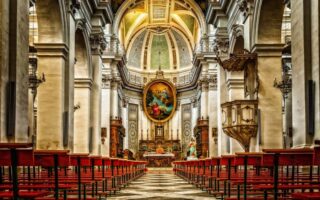Extreme Unction, also known as the Sacrament of the Anointing of the Sick, is a sacrament of the Catholic Church that is administered to those who are seriously ill or in danger of death. It involves the anointing of the sick person with blessed oil and the offering of prayers for their spiritual and physical healing.
Table of Contents
History of Extreme Unction in the Catholic Church
Have you ever heard of the term “Extreme Unction” in the Catholic Church? If not, you’re not alone. This sacrament, also known as the Anointing of the Sick, has a long history within the Catholic tradition. Let’s take a closer look at the origins and significance of Extreme Unction in the Catholic Church.
The practice of anointing the sick with oil dates back to ancient times, with references to this ritual found in both the Old and New Testaments of the Bible. In the Book of James, it is written, “Is anyone among you sick? Let them call the elders of the church to pray over them and anoint them with oil in the name of the Lord.” This passage is often cited as the basis for the sacrament of Extreme Unction in the Catholic Church.
Throughout history, the sacrament of Extreme Unction has evolved and undergone various changes. In the early centuries of Christianity, it was primarily administered to those who were seriously ill or near death. The anointing was believed to provide spiritual strength and comfort to the individual as they prepared to meet their maker.
During the Middle Ages, the sacrament of Extreme Unction became more formalized within the Catholic Church. It was seen as a way to prepare the soul for death and to cleanse it of sin before passing into the afterlife. The anointing was typically performed by a priest, who would use blessed oil to anoint the forehead and hands of the sick person.
In the 20th century, the sacrament of Extreme Unction underwent a significant transformation. Following the reforms of the Second Vatican Council in the 1960s, the ritual was renamed the Anointing of the Sick and its purpose expanded to include not only those who were near death, but also those who were seriously ill or facing major surgery.
Today, the sacrament of the Anointing of the Sick is seen as a way to bring healing and comfort to those who are suffering from physical, emotional, or spiritual ailments. It is often administered in hospitals, nursing homes, and other healthcare settings, as well as within the context of the Mass.
The sacrament of the Anointing of the Sick is typically performed by a priest, who anoints the forehead and hands of the sick person with blessed oil. The priest then offers prayers for healing and strength, asking for God’s grace to be poured out upon the individual.
In conclusion, the sacrament of Extreme Unction, now known as the Anointing of the Sick, has a long and rich history within the Catholic Church. From its origins in ancient times to its modern-day practice, this sacrament continues to provide comfort and healing to those who are suffering. Whether you are facing a serious illness or simply in need of spiritual support, the Anointing of the Sick is a powerful sacrament that can bring peace and strength in times of need.
The Sacrament of Anointing of the Sick
Have you ever heard of the term “Extreme Unction” in the Catholic Church? If not, you’re not alone. This sacrament, also known as the Anointing of the Sick, is one of the seven sacraments of the Catholic Church. It is a ritual that is performed on those who are seriously ill or in danger of death.
The Anointing of the Sick is a sacrament that is often misunderstood by many people. Some may think that it is only for those who are on their deathbed, but in reality, it can be administered to anyone who is seriously ill or facing a major surgery. The sacrament is meant to bring spiritual healing and strength to the person receiving it, as well as forgiveness of sins.
The sacrament of Anointing of the Sick is typically performed by a priest, who anoints the sick person with blessed oil on their forehead and hands. The priest then prays for the person’s healing and forgiveness of sins. This ritual is meant to bring comfort and peace to the person receiving it, as well as to their loved ones who may be present.
One of the key beliefs behind the Anointing of the Sick is the idea that physical illness is connected to spiritual well-being. By receiving this sacrament, the person is not only seeking physical healing but also spiritual healing and strength to endure their illness. It is a way for the person to connect with God and seek his grace and mercy during a difficult time.
The sacrament of Anointing of the Sick is also a way for the person to prepare for death, if that is the outcome of their illness. It is a way for them to receive the grace of God and be at peace with their impending death. It is a way for them to let go of any fear or anxiety they may have about dying and to trust in God’s plan for them.
In the Catholic Church, the sacrament of Anointing of the Sick is seen as a way to bring healing and comfort to those who are suffering. It is a way for the person to receive the grace of God and to be strengthened in their faith. It is a way for them to be surrounded by the love and prayers of their community, who are there to support them in their time of need.
So, the next time you hear the term “Extreme Unction” or Anointing of the Sick, remember that it is a sacrament of the Catholic Church that is meant to bring healing, comfort, and strength to those who are seriously ill or facing death. It is a way for the person to connect with God and seek his grace and mercy during a difficult time. And it is a way for them to be surrounded by the love and prayers of their community, who are there to support them in their time of need.
Rituals and Practices of Extreme Unction

Have you ever heard of the term “Extreme Unction” in the Catholic Church? If not, you’re not alone. This sacrament, also known as the Anointing of the Sick, is one of the seven sacraments of the Catholic Church. It is a ritual that is performed on those who are seriously ill or in danger of death. But what exactly does this sacrament entail, and why is it considered so important in the Catholic faith?
The sacrament of Extreme Unction involves the anointing of the sick person with blessed oil by a priest. This anointing is done on the forehead and hands of the individual, and the priest also offers prayers for the person’s healing and spiritual well-being. The sacrament is meant to bring comfort and strength to the sick person, both physically and spiritually, as they face their illness or impending death.
The origins of Extreme Unction can be traced back to the early Christian Church, where it was seen as a way to provide spiritual healing and support to those who were suffering. Over time, the sacrament evolved into what we now know as the Anointing of the Sick, with a focus on both physical and spiritual healing.
In the Catholic Church, Extreme Unction is considered a sacrament of healing, along with the sacraments of Reconciliation and the Eucharist. It is meant to bring the sick person closer to God and to provide them with the grace and strength they need to face their illness or death. The sacrament is not only for those who are seriously ill, but also for those who are elderly or facing surgery, as a way to prepare them for whatever lies ahead.
The sacrament of Extreme Unction is often misunderstood by those outside of the Catholic faith. Some may see it as a last resort for those who are on their deathbed, while others may view it as a superstitious ritual with no real meaning. However, for Catholics, the sacrament holds deep spiritual significance and is seen as a way to bring comfort and healing to those who are suffering.
One of the key aspects of Extreme Unction is the belief in the power of prayer and the presence of God in the sacrament. The anointing with blessed oil is seen as a physical sign of God’s grace and healing presence, and the prayers offered by the priest are believed to bring spiritual strength and comfort to the sick person. It is a way for the sick person to connect with God and to receive the grace they need to face their illness with faith and courage.
In conclusion, Extreme Unction is a sacrament of healing and comfort in the Catholic Church. It is a ritual that is performed on those who are seriously ill or in danger of death, as a way to bring them closer to God and to provide them with the grace and strength they need to face their illness. While it may be misunderstood by some, for Catholics, Extreme Unction is a powerful sacrament that offers spiritual healing and support to those who are suffering.
The Significance of Extreme Unction in Catholic Beliefs
Have you ever heard of the term “Extreme Unction” in the Catholic Church? If not, you’re not alone. This sacrament, also known as the Anointing of the Sick, is one of the seven sacraments in the Catholic faith. It is often misunderstood or overlooked, but its significance in Catholic beliefs is profound.
Extreme Unction is a sacrament that is administered to those who are seriously ill or in danger of death. It involves the anointing of the sick person with blessed oil and the offering of prayers for their healing and spiritual well-being. The sacrament is meant to bring comfort and strength to the sick person, both physically and spiritually, as they face the challenges of illness or the end of their life.
The origins of Extreme Unction can be traced back to the early Christian Church, where it was practiced as a form of healing and spiritual support for the sick and dying. Over time, the sacrament evolved and became more formalized within the Catholic Church, with specific rituals and prayers associated with its administration.
In the Catholic tradition, Extreme Unction is seen as a way to bring the healing presence of Christ to those who are suffering. The anointing with oil is a symbol of the Holy Spirit’s presence and power, bringing strength and comfort to the sick person. The prayers offered during the sacrament are meant to bring peace and consolation, as well as forgiveness of sins and preparation for the journey to eternal life.
One of the key beliefs underlying Extreme Unction is the idea of the connection between body and soul. In Catholic theology, the body is seen as a temple of the Holy Spirit, and the sacrament of Extreme Unction is a way to care for and honor the body, even in times of illness or suffering. By anointing the sick person with oil, the Church acknowledges the sacredness of the body and the need for healing on all levels – physical, emotional, and spiritual.
Extreme Unction is not just about physical healing, but also about spiritual healing and preparation for the afterlife. The sacrament is meant to bring comfort and peace to the sick person, as well as to their loved ones who may be struggling with the challenges of illness or death. It is a way for the Church to offer support and care to those in need, and to remind them of God’s presence and love in their lives.
In conclusion, Extreme Unction is a sacrament with deep significance in Catholic beliefs. It is a way for the Church to bring healing and comfort to those who are sick or dying, and to offer support and prayers for their well-being. The sacrament is a reminder of the sacredness of the body and the connection between body and soul, as well as a preparation for the journey to eternal life. So next time you hear about Extreme Unction, remember its importance in the Catholic faith and the comfort it brings to those in need.
Misconceptions and Controversies Surrounding Extreme Unction
Extreme Unction, also known as the Anointing of the Sick, is a sacrament in the Catholic Church that is often misunderstood and surrounded by misconceptions. This sacrament is often associated with death, leading many to believe that it is only administered to those who are on their deathbed. However, this is not entirely accurate.
The Anointing of the Sick is actually meant to bring spiritual healing and strength to those who are suffering from serious illness or facing a major surgery. It is a sacrament of healing, not just for physical ailments, but also for emotional and spiritual struggles. The sacrament is meant to provide comfort and peace to the sick person, as well as to their loved ones who may be struggling to cope with the illness.
One common misconception about Extreme Unction is that it is only administered once in a person’s lifetime. In reality, the sacrament can be received multiple times, especially if the person’s condition worsens or if they face a new health crisis. The sacrament can be administered in a hospital, at home, or in a church, depending on the circumstances and the wishes of the person receiving it.
Another misconception surrounding Extreme Unction is that it is only for the elderly or those who are near death. While it is true that the sacrament is often administered to the elderly and those who are seriously ill, it is not limited to any specific age group. Anyone who is facing a serious illness or health crisis can receive the Anointing of the Sick, regardless of their age or the severity of their condition.
There is also some controversy surrounding Extreme Unction, particularly in the modern era. Some critics argue that the sacrament is outdated and no longer relevant in today’s society. They believe that modern medicine and technology have made the sacrament unnecessary, as they can provide physical healing without the need for spiritual intervention.
However, proponents of Extreme Unction argue that the sacrament provides a different kind of healing that cannot be achieved through medical treatment alone. The Anointing of the Sick offers spiritual comfort and strength to those who are suffering, helping them to find peace and acceptance in the face of illness and uncertainty.
In conclusion, Extreme Unction is a sacrament in the Catholic Church that is often misunderstood and surrounded by misconceptions. It is not just for the elderly or those who are near death, but for anyone facing a serious illness or health crisis. The sacrament provides spiritual healing and strength to the sick person, offering comfort and peace in times of struggle. While there may be controversy surrounding Extreme Unction in the modern era, many still believe in the power of this sacrament to bring healing and solace to those in need.
Conclusion
Extreme Unction, also known as the Anointing of the Sick, is a sacrament in the Catholic Church that is administered to those who are seriously ill or in danger of death. It involves the anointing of the forehead and hands with blessed oil, accompanied by prayers for healing and forgiveness of sins. The sacrament is meant to bring spiritual strength and comfort to the individual, and to prepare them for the passage from this life to the next.


